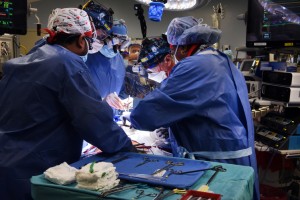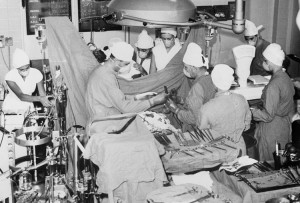The First Pig to Human Heart Transplant
Tuesday, January 25th, 2022
Surgeons performed an eight-hour procedure to transplant a genetically modified pig’s heart into a human on Jan. 7.
Credit: University of Maryland School of Medicine
For the first time ever, surgeons at the University of Maryland Medical Center successfully transplanted a heart from a genetically modified pig to a human. The eight-hour surgery took place on Jan. 7, 2022, in Baltimore, Maryland. The recipient was a 57-year-old man with heart disease, called arrhythmia. He was deemed too sick to receive a human heart. Scientists had altered the genes of the pig to make it more similar to humans, removing four pig genes and adding six human genes through genetic engineering.
More than 107,000 people are on waiting lists to receive organ donations in the United States. Transplanted tissues and organs replace diseased, damaged, or destroyed body parts. They can help restore the health of a person who might otherwise die or be seriously disabled. Commonly transplanted organs include the heart, lungs, kidney, and liver.
Because of the shortage of human organs, researchers are actively investigating the use of donor organs from animals. Transplanting organs from one species to another is called xenotransplantation. Use of pigs as organ donors is an especially active area of research. Pigs are already widely raised for food and leather, and their organs are about the same size as adult human organs. One major concern is preventing accidental transfer of viruses from other animals to people. Another challenge is preventing the recipient’s immune system from destroying a donor organ. If the immune system recognizes that a transplanted organ came from outside the body, the system attacks the organ as a dangerous invader. This reaction is called rejection. Doctors try to prevent rejection by choosing the best donor and prescribing immunosuppressive drugs, which are special medications to protect the transplant.
Xenotransplantation has been studied for over 60 years but is not authorized in the United States. The process of raising genetically modified animals to harvest their organs is widely debated. The Food and Drug Administration gave the surgery team an emergency authorization on Dec. 31, 2021, to conduct the transplant due to the recipient’s condition.
From the long list of people waiting to receive a lifesaving organ, 17 people die each day. This groundbreaking surgery is giving hope to many patients and their family members who are waiting on organs. However, many surgeons and experts believe it is too early to call this xenotransplantation a success.



